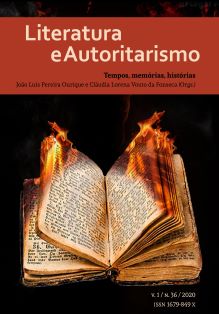Narration and Memory: The Heritage of Evangelina in Azul-Corvo
DOI:
https://doi.org/10.5902/1679849X63299Keywords:
Adriana Lisboa, Contemporary narrator, Memory, Identity, Brazilian civil-military regimeAbstract
This study aims to understand the narrator in the novel Azul-Corvo (2010). Thus, it is necessary to understand how this narrator, who is Evangelina, behaves in front of her with all the work about collecting and organizing memories, these sometimes involving the memory of other characters; we try to perceive how such a process interconnects the intention of the novel to seek totality of the character's identity. To this end, we seek to understand the posture of the contemporary narrator and how it manifests itself in Lisboa's production, in addition to apprehending the treatment of questions about traumatic historical events, such as the Brazilian civil-military regime in 1964. The intention is, therefore, understand how the narrator's contact with this memorialistic universe, the relationships she builds with other characters contribute to the protagonist's final state of wholeness and, consequently, to the way she narrates. As a theoretical-critical basis, studies by Karl Eric Schøllhamer (2011), Theodor Adorno (2012), Jöel Candau (2011), among others, were used.Downloads
References
ADORNO, Theodor. Posição do narrador no romance contemporâneo. In: Notas de literatura I. Trad. Jorge de Almeida. 2. ed. São Paulo: Duas cidades; Editora 34, 2012.
BENJAMIN, Walter. O Narrador: considerações sobre a obra de Nikolai Leskov. In: Magia e Técnica, Arte e Política: ensaios sobre literatura e história da cultura. São Paulo: Brasiliense, 1996.
CANDAU, Joël. Memória e identidade. São Paulo: Contexto, 2011.
COMISSÃO NACIONAL DA VERDADE. Disponível em: < http://www.cnv.gov.br/>. Acesso: 15 de nov. de 2019.
DALCASTAGNÈ, Regina. Literatura brasileira contemporânea: um território contestado. Rio de Janeiro: Horizonte, 2012.
GAGNEBIN, Jeanne Marie. Memória, história, testemunho. In: ____. Lembrar, escrever, esquecer. São Paulo: Editora 34, 2006.
GINZBURG, Jaime. O narrador na literatura brasileira contemporânea. Tintas. Quaderni di letterature iberiche e iberoamericane, São Paulo, n. 2, p. 199-221, 2012.
HALBWACHS, Maurice. A memória coletiva. São Paulo: Centauro, 1990.
HALBWACHS, Maurice. A memória coletiva. Trad. Laurent Léon Schaffter. 2. ed. São Paulo: Vértice, 1990.
LISBOA, Adriana. Azul-Corvo. Rio de Janeiro: Rocco, 2010.
SARLO, Beatriz. Cultura da memória e guinada subjetiva. Trad. Rosa Freire D’Aguiar. São Paulo: Companhia das Letras, 2007.
SCHØLLHAMER, Karl Eric. Ficção brasileira contemporânea. Rio de Janeiro: Civilização Brasileira, 2011.
SELIGMANN-SILVA, Márcio. Narrar o trauma – a questão dos testemunhos de catástrofes históricas. Psic. Clin., Rio de Janeiro, vol.15, n.2, 2003.
Downloads
Published
How to Cite
Issue
Section
License
DECLARAÇÃO DE ORIGINALIDADE E EXCLUSIVIDADE E CESSÃO DE DIREITOS AUTORAIS
Declaro que o presente artigo é original e não foi submetido à publicação em qualquer outro periódico nacional ou internacional, quer seja em parte ou na íntegra. Declaro, ainda, que após publicado pela Literatura e Autoritarismo, ele jamais será submetido a outro periódico. Também tenho ciência que a submissão dos originais à Literatura e Autoritarismo implica transferência dos direitos autorais da publicação digital. A não observância desse compromisso submeterá o infrator a sanções e penas previstas na Lei de Proteção de Direitos Autorais (nº 9610, de 19/02/98).






